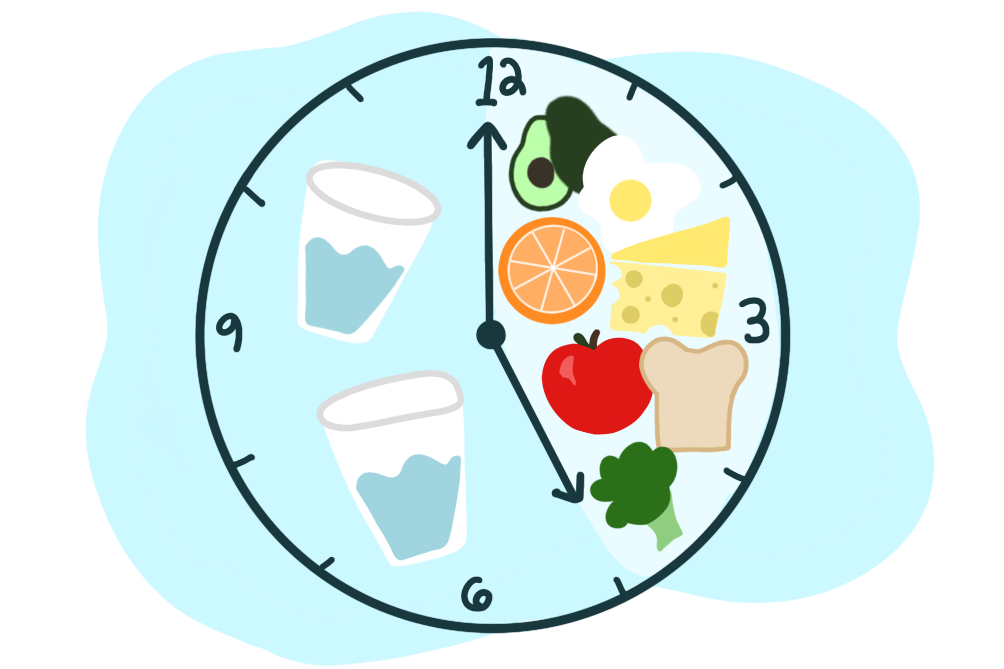
According to the ancient Indian system of medicine, Ayurveda, people should mend their diets with seasons and detoxify at least once a year. Be it in the name of religion or rituals, fasting helps people rebalance their bodies if practiced in the right fashion. Fasting isn’t a new concept. For centuries, people have temporarily restricted their food intake; be it for religious reasons or health reasons. In the past few years, intermittent fasting has gained traction for its incredible effects on disease, aging, and weight loss.
Read on to know about the role of intermittent fasting in weight loss!
What is Intermittent Fasting?
Intermittent fasting is an eating pattern that cycles between periods of fasting lasting from a few hours to 1-2 days. This pattern does not specify which foods you should eat but rather when you should eat them.

Types of Intermittent Fasting
There are different intermittent fasting methods. These are:
- The 5:2 method: Here you normally eat for five days a week and fast for the other 2 days. Even if you eat during fasting days, you should keep your calorie intake between 500-600 calories.
- The Eat-Stop-Eat Method: This method, restricts all foods for 24 hours once or twice a week.
- The 16/8 method: This approach dictates food consumption within 8 hours and fasting for the remaining 16 hours. It can be done every day or a few times a week.

How does it Work?
When you fast, several things happen in your body on the cellular and molecular level. The following changes occur in the body:
- Increase in Human Growth Hormone (HGH): The levels of growth hormone increase as much as 5 times. Studies have shown that fasting enhances growth hormone secretion and amplifies the complex rhythms of the secretion, which aids fat loss and muscle gain.
- A decrease in insulin levels: The sensitivity of insulin improves and levels of insulin drop dramatically. Lower insulin levels make stored body fat more accessible for the body to use and also help to lower bad cholesterol levels.
- Initiation of cellular repair: When you fast, the cells initiate cellular repair processes like autophagy; wherein the cells digest and remove old and dysfunctional proteins that build up within cells. Autophagy helps cleanse waste from the body, provides energy, and potentially fights cancer and other chronic illnesses.

Intermittent Fasting and Weight Loss
The most common reason for the implementation of intermittent fasting is weight loss. As you consume fewer calories, intermittent fasting leads to an automatic reduction in weight. Additionally, intermittent fasting changes hormone levels to facilitate weight loss which may be due to the stimulation of certain growth hormones.

In addition to lowering insulin and increasing growth hormone levels, intermittent fasting increases the release of fat-burning hormones. As a result, these changes in hormones may increase the metabolic rate of the body during short-term fasting.
Studies have also proven that intermittent fasting for weight loss is successful compared to other methods. A 2014 review study found that such an eating pattern can cause 3–8% weight loss in a time span of 3–24 weeks, which is a significant amount compared to most weight loss studies. It also showed that people had a 4–7% reduction in their waist circumference, indicating a significant loss of fat.
According to Harvard Health Publishing, enzymes break down food in our gut into molecules, which then enter the bloodstream. The carbohydrates we consume break down into sugar, the energy source for the cells in the body. If the cells don’t use all the energy, they store the excess in our cells as fat. During fasting, our insulin levels go down, and our fat cells release the stored sugar to be used as energy. Thus, intermittent fasting forces the insulin levels to drop, so that our body is triggered to use the stored fat to fulfill its energy requirements. This causes fat reduction, and thereby we lose weight.
Could Keto be the answer you were Looking for? Read on!
How to do Intermittent Fasting?
Many people find the 16/8 method the simplest and most sustainable way of intermittent fasting. If no health problem occurs during fasting, then maybe you can move on to more advanced fasts like the 24-hour fasts, one or two times per week, or only eating 500–600 calories, one or two days per week.

Another easier and simpler approach is to fast whenever it’s convenient—simply skip meals from time to time when you’re not hungry or don’t have the time to cook. However, here are the things you will need to follow to make intermittent fasting effective.
- Avoid foods like sugars and refined grains. Instead, consume healthy foods like fruits, vegetables, beans, lentils, whole grains, lean proteins, and healthy fats (a sensible, plant-based, Mediterranean-style diet).
- Do not snack and let the body burn fat between meals. Be active throughout your day by incorporating a light exercise routine into the schedule.
- Avoid eating at night time. Even if you do, make sure it’s something healthy.

Will the Intermittent Fasting Diet help me Lose Weight?
According to metabolic expert Dr. Deborah Wexler, Director of the Massachusetts General Hospital Diabetes Center and associate professor at Harvard Medical School, there is evidence to suggest that the circadian rhythm fasting approach, where meals are restricted to a window of 8 to 10-hour period of the daytime, is effective.
There is some good scientific evidence suggesting that intermittent fasting, when combined with a healthy diet and lifestyle can be a particularly effective approach to lose weight.
So, go ahead, and incorporate intermittent fasting in your routine. However, be careful not to overdo it as it may lead to negative side effects.


.png)


